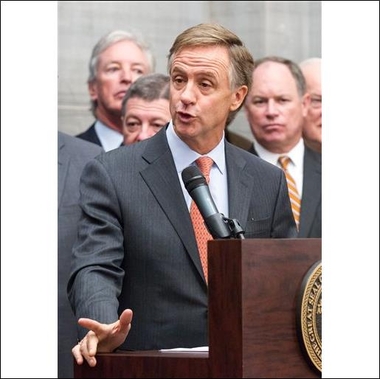GOP legislators thwart bids to expand Medicaid

Washington (AP) — Governors across the political spectrum are hitting a roadblock in their bids to expand Medicaid with federal funds: Republican legislators who adamantly oppose "Obamacare."
While some of these governors themselves have criticized the president's health care law in general, they've come to see one component — Medicaid expansion — as too generous to reject. But they're battling conservative lawmakers who say it's better to turn down billions of federal dollars than to expand Medicaid under the 2010 law.
Partisan politics have driven states' Medicaid decisions ever since the Supreme Court ruled in 2012 that expansion was optional, not mandatory, under the new law. Within months, every Democratic governor agreed to expand Medicaid (although Republican legislatures blocked a few of those efforts).
Only nine states with Republican governors accepted the offer.
Medicaid, the health insurance program for low-income and disabled people, covers about 65 million Americans, more than one in five. The federal government will pay the full expansion cost for the first three years, and gradually reduce the subsidy to 90 percent. That's more than the traditional Medicaid federal match to states.
The law expanded Medicaid eligibility to adults with annual incomes up to 138 percent of the federal poverty level. That will qualify an individual making less than $16,105, and a family of four earning less than $32,913.
So far, 27 states have agreed to expand Medicaid. But several more, including some with Republican governors, now want in. These governors note that their residents pay the federal taxes that fund expansions, so declining to participate amounts to subsidizing other states without receiving benefits.
Several Republican governors and one independent are meeting Republican legislative resistance to their expansion proposals. Some have tried to woo conservatives by adding "free enterprise" provisions, which require federal approval.
Perhaps the most aggressive GOP governor is Bill Haslam of Tennessee, who won re-election in November. Meeting with newspapers and others, Haslam now says Medicaid expansion is "morally and fiscally the right thing to do."
He told the Chattanooga Times Free Press that nearly every elected Republican in Tennessee "has run sometime in the last four years saying, 'I think Obamacare is really bad.'" He said his plan "is not Obamacare." Among other changes, it would offer vouchers to newly eligible adults to help pay for employer-sponsored coverage, and require co-payments for treatment.
Some top Republican lawmakers have praised Haslam's idea. But others vow to fight it, calling the governor's tweaks meaningless. State Sen. Brian Kelsey says Tennessee voters elected Republicans to shrink government, not expand it.
In Wyoming, Gov. Matt Mead opposed Medicaid expansion during his first term but now says it would save the state money and provide needed insurance to poor people.
A committee of Wyoming's GOP-controlled legislature created uncertainty, however, by endorsing a different version. It's modeled on an Indiana plan that would require new Medicaid recipients to pay into a fund similar to a health savings account.
Federal officials have not approved the Indiana plan, backed by Republican Gov. Mike Pence.
Alaska's new independent governor-elect Bill Walker and North Carolina's Republican Gov. Pat McCrory also face serious GOP legislative opposition to their ideas for expanding Medicaid. Virginia's Republican-controlled legislature has thwarted Democratic Gov. Terry McAuliffe's repeated expansion efforts.
Arkansas could become the first state to rescind a decision to expand Medicaid. Term-limited Democratic Gov. Mike Beebe negotiated a modified expansion plan with the Republican-controlled legislature. But Republicans made dramatic gains in the November elections, and some legislators want to undo the decision.
Republican Gov.-elect Asa Hutchinson has yet to announce his position, which could prove crucial.
Matt Bennett of the centrist-Democratic group Third Way says governors are often more pragmatic than legislators.
"Becoming the chief executive of basically anything tends to have a moderating influence on people," Bennett said. Governors must represent entire states and balance their budgets, he said, "so when someone offers you a lot of money," it's hard to reject.
That's what several Republican governors said when they agreed to expand Medicaid despite their party's aversion to "Obamacare." Nevada Gov. Brian Sandoval told a newspaper editorial board, "I couldn't sit here and defend to any of you $16 million that just went away because of 'principle.'"
Drew Altman, president and chief executive officer of the Kaiser Family Foundation, said many state legislatures are becoming more ideologically conservative or liberal for the same reasons the U.S. House has. Lawmakers increasingly are elected "from very red or blue districts" that "don't represent the state as a whole," he said.
Altman, a top health adviser to former Republican Gov. Tom Kean of New Jersey, says it can be politically smart for a Republican legislator to strongly oppose "Obamacare" and Medicaid. Medicaid is effective and needed, he said, but many conservatives consider it a massive government handout.
By Charles Babington, Associated Press. Copyright 2015 The Associated Press. All rights reserved. This material may not be published, broadcast, rewritten or redistributed.
The Gayly – January 1, 2015 @ 2:55pm





